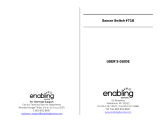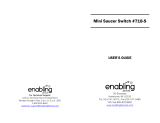Page is loading ...

Snap Circuits uses electronic blocks that snap onto a base grid to build different circuits. These blocks have
different colors and numbers on them so that you can easily identify them. Build the circuit shown by placing
all the parts with a black 1 next to them on the clear base grid first. Then, assemble parts marked with a 2.
Install three (3) “AA” batteries (not included) into the battery holder (B3). Place the fan on the motor (M1).
When you press the press switch (S2), the motor will slowly increase in speed. When the motor has reached
maximum rotation, release the press switch. The fan should rise and float through the air like a flying saucer.
Be careful not to look directly down on the fan while it is spinning.
The air is being blown down through the blade and the motor rotation locks the fan on the shaft. When the
motor is turned off, the blade unlocks from the shaft and is free to act as a propeller and fly through the air.
If the speed of rotation is too slow, the fan will remain on the motor shaft because it does not have enough
lift to propel it.
The motor will spin faster when the batteries are new.
Rebuild the circuit from project #1, but reverse the polarity on the motor
(M1) so the positive (+) on the motor goes to the positive (+) on the
battery holder (B3).
Cut out the printed pattern from the cardboard along the dotted line with
scissors and tape it to the fan blade. Spin the pattern by briefly pressing
the press switch (S2). You will see the most interesting effects when the
pattern is spinning slowly.
If y
ou ha
ve an
y pr
ob
lems,
contact Elenco
®
Copyright © 2005 Elenco
®
Electronics, Inc. All Rights Reserved. • 150 Carpenter Ave. • Wheeling, IL 60090
(800) 533-2441 Fax: (847) 520-0085 • e-mail: [email protected] • Web site: www.elenco.com or www.snapcircuits.net
PPrroojjeecctt ##11 FFllyyiinngg SSaauucceerr
Use the circuit from project #3. Using the fan as a guide, draw a circle
on a piece of cardboard or paper. Cut the circle out with scissors and
tape it to the fan blade so it can be easily removed later (you may
remove the red spiral pattern first). Obtain some thin and thick marking
pens to use as drawing tools.
Spin the paper by pressing and holding the press switch (S2) down.
Gently press the marker on the paper to form rings. To make spiral
drawings, release the press switch and as the motor approaches a slow
speed, move the marker from the inside outward quickly.
Change the colors often and avoid using too much black to get hypnotic
effects. Another method is to make colorful shapes on the disc then spin
the disc and watch them blend into each other.
P
P
r
r
o
o
j
j
e
e
c
c
t
t
#
#
3
3
Hypnotic Pattern
PPrroojjeecctt ##44
Spin Draw
Use the circuit from project #4. Using a blank cutout, draw several straight
lines from the edges through the center, evenly spaced like spokes on a
bicycle wheel. Place the cutout on the fan and place atop the motor.
Place the circuit under a fluorescent light in your home and spin the disc
slowly. As the speed changes, you may notice the lines first seem to
move in one direction, then they start moving in another direction. This
effect is because the lights are blinking 60 times a second and the
changing speed of the motor is acting like a strobe light to catch the
motion at certain speeds.
P
P
r
r
o
o
j
j
e
e
c
c
t
t
#
#
5
5
Strobe the House Lights
WARNING: SHOCK HAZARD -
Never connect Snap Circuits
to the electrical outlets in your
home in an
y way!
WARNING: Always check your wiring before
turning on a circuit. Never leave a circuit
unattended while the batteries are installed.
Never connect additional batteries or any other
power sources to your circuits.
Flying Saucer
Model SCP-06
!
WARNING: Moving parts. Do not
touch the fan or motor during
operation.
!
WARNING: Do not lean over the
motor.
PPrroojjeecctt ##22 FFaann
Rebuild the circuit from project #1, but reverse the polarity on the motor so the positive (+) on the motor goes
to the positive (+) on the battery holder (B3). Place the fan on the motor and press the press switch (S2).
Current flows from the batteries through the motor (M1), making it spin the fan. The fan blows air up and
away from the motor, just like an electric fan in your home. The fan will not fly off.
In this project, you changed electrical power into mechanical power. DC motors are used in all of the battery
powered equipment requiring rotary motion, such as a cordless drill, electric toothbrush, and toy trains that
run on batteries just to name a few. An electric motor is much easier to control than gas or diesel engines.
753145
Note

BATTERIES:
Use only 1.5V AA type (not included).
Inser
t batteries with correct polarity.
Non-rechargeable batteries should not
be recharged. Rechargeable batteries
should only be charged under adult
supervision, and should not be
recharged while in the product. Do not
mix alkaline, standard (carbon-zinc), or
rechargeable (nickel-cadmium)
batteries. Remove batteries when they
are used up. Do not short circuit the
battery terminals. Never throw batteries
in a fire or attempt to open its outer
casing. Batteries are harmful if
swallowed, so keep away from small
children.
Important: If any parts are missing or
damaged, DO NOT RETURN TO RETAILER.
Call toll-free (800) 533-2441 or e-mail us at:
help@elenco.com.
Customer Service • 150 Carpenter Ave. •
Wheeling, IL 60090 U.S.A.
You may order additional / replacement parts
at our web site: www.snapcircuits.net
Qty. ID Name Part #
r 1 Base grid 6SCBGM
r 1 3 3-snap wire 6SC03
r 1 B3 Battery holder 6SCB3
r 1 M1 Motor 6SCM1
r 1 Fan 6SCM1F
r 1 Cardboard
pattern 6SCM1C
r 1 S2 Press switch 6SCS2
OTHER SNAP CIRCUITS PRODUCTS!
FM Radio
Model SCP-02
Motion Detector
Model SCP-03
Music Box
Model SCP-04
PARTS LIST
Contact Elenco
®
to find out where you can purchase these products.
Snap Circuits Jr. Model SC-100
Build over 100 projects, contains over 30 parts.
Snap Circuits Model SC-300
Build over 300 projects, contains over 60 parts.
Snap Circuits Pro
Model SC-500
Build over 500 projects, contains over 75 parts.
Snap Circuits Extreme
Model SC-750
Build over 750 projects, contains over 80 parts, and PC interface included.
Musical Recor
der
Model SCP-01
Space Battle
Model SCP-05
/


